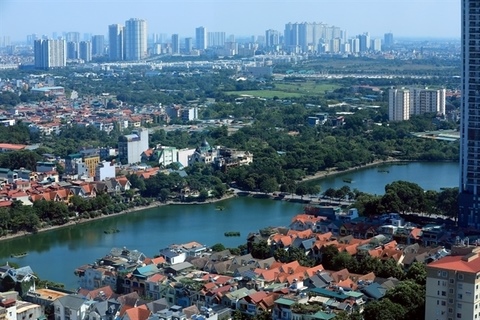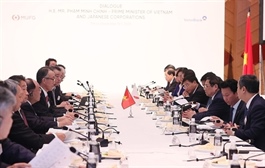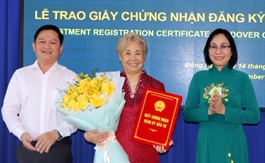HN set growth targets for 2024
HN set growth targets for 2024
Chairman of the People's Committee of Hà Nội Trần Sỹ Thanh tasked the People's Committees of towns and districts to base their plans on the capital city's targets, the assigned targets, and the resolutions of the City People's Council. They are to ensure accurate and sufficient allocation according to the city's targets and organise the implementation to achieve the assigned plan.

A view of the Nhật Tân Bridge in Tây Hồ District, Hà Nội. — VNA/VNS Photo |
Hà Nội has set several targets for next year as the capital city aims to maintain growth in the industrial sector by 7-7.5 per cent, service by 6.64-7.23 per cent, construction by 8-8.5 per cent, investment capital by 10-11.5 per cent and export turnover by 4-5 per cent, with per capita GRDP reaching VNĐ162 million (US$6,650) and local budget revenue reaching VNĐ408,5 trillion.
Simultaneously, a directive has been issued to enforce the assigned targets and tasks, adhere to the reporting system regularly on monthly, quarterly, 6-month, and annual results in 2024 on the City People's Committee's reporting information system, and submit to the Department of Planning and Investment for consolidation.
The city's departments, agencies, sectors, and People's Committees of towns and districts propose five focal tasks (in order of priority, with specific completion times) to be submitted to the Department of Planning and Investment for consolidation. The Department of Planning and Investment, based on the guidance of the Government, resolutions of the City People's Council, and the guidance of the City People's Committee, issues an action programme to implement the tasks, guiding solutions for economic and social development, and the state budget estimate to organise the implementation to complete the plan and tasks in 2024.
Regarding the budget estimates, the Chairman of the Hà Nội People's Committee requires all levels, departments, and subordinate units to seriously implement the content of decentralised revenue sources, and budget expenditure tasks according to the resolutions of the City People's Council. This includes tightening discipline, strengthening the responsibility of leaders in financial management, and complying strictly with Directive 12/CT-UBND dated July 26, 2023, of the Chairman of the People's Committee of the capital city on rectifying, enhancing discipline in complying with the laws on finance and the state budget.
For state budget revenue collection, the Tax Department and Customs Department of the city take the lead, and coordinate with departments, agencies, and People's Committees of towns and districts to effectively implement the State Budget Law, amended tax laws, and state budget collection tasks according to the Prime Minister's Decision and the City People's Council's resolution.

View of a new residential area located in Long Biên District, Hà Nội. — VNA/VNS Photo |
Additionally, they are required to intensify the management of state budget revenue, urge the recovery of overdue tax debts, reduce the rate of overdue tax debts, continue to implement administrative procedure reforms on taxes, promote the digitisation of tax management, and closely manage tax refund beneficiaries to ensure compliance with legal provisions. They must also take strict actions against smuggling, counterfeiting, transfer pricing, tax evasion, tax fraud, and abuse of tax refund policies, ensuring accurate, sufficient and timely collection of taxes, fees, levies and other revenues into the state budget.
The Department of Finance is asked to focus on expediting the process of equitisation, and divestment of state capital in enterprises, ensuring efficiency and strictness, and avoiding losses of state capital and assets in enterprises. The Department of Natural Resources and Environment must review and resolve difficulties and obstacles in procedures for land allocation, land leasing, auctioning land use rights, determining land prices, and financial obligations for land. It is tasked to urgently advise the City People's Committee to issue and implement the Plan to exploit surplus land funds such as the land fund near Ring Road 4, the land funds under build-transfer (BT) projects that are currently not eligible for implementation according to the Investment Law through public-private partnerships.
Departments, agencies, sectors, associations, organisations, and units under the City and People's Committees of districts, towns, and districts are directed to strictly implement regulations on auctions when transferring, leasing state assets, allocating land, and leasing land according to legal provisions. They need to manage, use, rearrange and handle state assets within their management scope to ensure economy, efficiency and compliance with standards and norms, and implement the Efficient Management, Use and Exploitation of State Assets in Hanoi City Project for the 2023-2025 period, with orientations for the 2026-2030 period, ensuring schedule and quality.
Districts, towns, and districts must allocate budget estimates to ensure they are not lower than the legal budget estimates assigned by the city People's Committee. For items with higher revenue estimates assigned by the city, feasibility must be ensured in the implementation, especially in collecting land use fees, to avoid affecting the budget balance and the allocation of funds for projects and tasks assigned in the annual budget.
Regarding state budget expenditure, departments, agencies, sectors, associations, organisations and units under the city should assign budget expenditure estimates to subordinate units that use the budget, ensuring a correct match with the estimates assigned by the city, both in total and detail for each expenditure category. They should ensure compliance with the prescribed time, regulations, standards and norms of state budget expenditures determined by the authorised state agencies. They must allocate funds to implement the regimes and policies already issued by the state, tasks to ensure social security, and the tasks assigned by the capital city.
For investment projects using the town and district-level budget and the city's support funds, the People's Committees of towns and districts must allocate concentrated public investment estimates, ensuring a focused approach and adherence to the principle of allocating sufficient capital to pay off the entire basic construction debt as regulated by law (if any). They must allocate sufficient funds for completed projects handed over for use before 2024.
The remaining capital will be allocated for transitional projects to be completed in 2024, and transitional projects that are implemented according to the approved schedule, with priority given to allocating funds for projects with good progress to complete the projects. New projects will not be allocated capital if there is insufficient funding to pay off the basic construction debt, and the transitional projects are not scheduled yet and feasible. Balanced allocation of funds for the implementation of projects needs to be ensured to meet the requirements and complete the planned targets requested by the City People's Council.
For projects under the expenditure responsibility of the district-level budget supported by the capital city budget for the sectors of health, education or heritage (including decentralised high schools), craft village wastewater treatment projects, infrastructure in the affected area of the waste landfill, a centralised cemetery of the city, economic infrastructure projects, and village cultural houses, the city budget will support the construction funds and equipment costs (if any) of the projects.



























